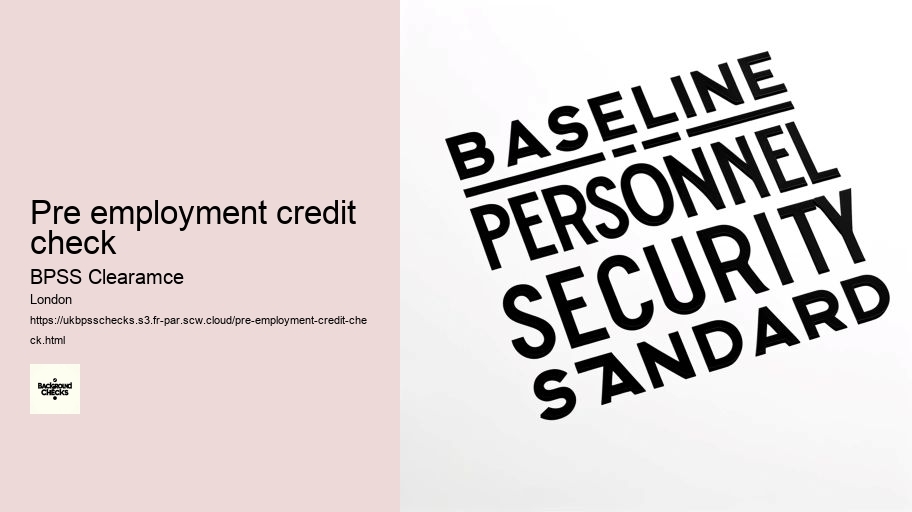
Remember to disclose any significant periods of six months or more spent abroad within the last three years as part of the BPSS clearance procedure. By organizing and presenting these essential documents accurately, you can expedite the verification process and demonstrate your suitability for accessing UK OFFICIAL assets.
By verifying your identity, legal right to work status, and employment history accuracy, organizations can establish a secure work environment and prevent unauthorized access to data. BPSS clearance is essential for individuals with access to government assets and sensitive information, as it confirms the honesty and integrity required for specific roles.
BPSS clearance also involves an extensive check of an individual’s right to work in the UK, ensuring compliance with the Immigration, Asylum, and Nationality Act 2006. This legal requirement helps employers avoid penalties and fines associated with employing illegal workers. It also reinforces the security of the working environment by ensuring that all employees are legally entitled to work.
Finally, while both BPSS and BS7858:2019 are crucial for their respective fields, the choice of which standard to apply depends on the specific needs of the organization and the nature of its work. BPSS is suitable for general employment in government-related roles requiring a basic level of security assurance. In contrast, BS7858:2019 is tailored for roles where employees handle sensitive information, work in secure environments, or where there is a high requirement for trust and security integrity.
One of the major differences lies in the handling and treatment of criminal records. BPSS checks usually involve a basic disclosure, revealing only unspent convictions under the Rehabilitation of Offenders Act 1974. Conversely, BS7858:2019 can require a more thorough examination, potentially including spent convictions and other details depending on the risk assessment of the specific job role, reflecting its focus on positions where security is critically important.
- Familiarize yourself with the guidelines and protocols for handling UK OFFICIAL information.

Guaranteeing the accuracy of right to work status and conducting international criminal record checks can also be challenging aspects of the BPSS process. Complex employment histories or discrepancies in provided information may further slow down clearance procedures.
1. **International Background Checks:** Expect a growing emphasis on international screenings to guarantee thorough vetting for BPSS compliance.
Lastly, employers conducting BPSS checks must have clear policies in place for handling sensitive information and addressing any security concerns that may arise. These policies should outline the steps to be taken if a potential security threat is identified during the BPSS process, including how to manage and mitigate such risks appropriately. By adhering to these rules, employers not only protect the integrity of their operations but also uphold the rights and dignity of their employees, ensuring a secure and respectful work environment.
- Highlight any security-sensitive activities or exposures encountered while abroad.
Digital technology has significantly streamlined the Baseline Personnel Security Standard (BPSS) process by enabling faster gathering and verification of applicant information. Automation tools and online databases allow for rapid identity verification and employment history checks, reducing the time it takes to complete a BPSS clearance compared to manual processes.
When it comes to safeguarding sensitive information and ensuring trustworthiness in certain roles, the BPSS check plays a pivotal role. Have you ever wondered how this meticulous screening process impacts various sectors and the individuals involved? Delving into the intricacies of BPSS clearance can reveal a world of protocols, challenges, and future adaptations that are essential for maintaining security standards. Understanding the nuances of this screening procedure could shed light on its significance in today's security-conscious landscape.


Employers who request BPSS checks must adhere to strict legal and ethical guidelines to ensure the process is conducted fairly and lawfully.
IT professionals working with government systems manage secure networks and data that, if compromised, could pose significant risks to national security. BPSS clearance ensures that those tasked with this responsibility are verified to be reliable and trustworthy.
3. **Check Criminal Records:** Perform a background check to identify any criminal history that could pose a risk.
These challenges underscore the importance of thorough and meticulous verification processes to uphold the integrity and effectiveness of the BPSS screening.
While BPSS checks aren't formal security clearances, they're vital for accessing UK OFFICIAL and occasional UK SECRET assets. By undergoing this screening, you not only demonstrate your trustworthiness but also contribute to maintaining the security and confidentiality of sensitive information within your organization.
4. Renewal involves re-verifying right to work, identity, criminal records, and employment history.

For positions within the UK government and its contractors, BPSS clearance is not just a formal requirement but a critical security measure. It ensures that individuals handling classified information or involved in security-sensitive activities are appropriately vetted and continuously monitored throughout their employment.
During the BPSS process, the right to work check typically involves reviewing and verifying documents that prove an individual's eligibility to work in the UK. These documents can include passports, biometric residence permits, national identity cards, and work visas.
Another key distinction is in ongoing monitoring and renewal requirements. BPSS does not have a formal ongoing monitoring or renewal policy; it is primarily conducted at the time of hiring. In contrast, BS7858:2019 requires that the screening process is updated every three years, or more frequently depending on company policy, to ensure that the security status of employees does not change over time.
BPSS stands for "Baseline Personnel Security Standard." It's essentially a basic level of security clearance required for individuals working in roles that involve access to sensitive information or facilities, especially in the public sector. The BPSS checks typically include identity verification, employment history checks, and criminal record checks.
No, BPSS (Baseline Personnel Security Standard) and DBS (Disclosure and Barring Service) are not the same.
BPSS (Baseline Personnel Security Standard): This is a set of government guidelines in the United Kingdom for ensuring the security clearance of individuals working with sensitive information or in certain roles. It is a basic level of security clearance and involves checks such as identity verification, employment history, and criminal record checks. BPSS is often required for roles in both the public and private sectors where access to sensitive information or facilities is involved.
DBS (Disclosure and Barring Service): This is a government agency in the UK that performs checks on individuals working with children or vulnerable adults. The DBS conducts criminal record checks (previously known as CRB checks) to help organizations make safer recruitment decisions by identifying candidates who may be unsuitable for certain roles due to past criminal convictions, cautions, reprimands, or warnings.
While both BPSS and DBS involve background checks, they serve different purposes and are used in different contexts. BPSS focuses on security clearance for a broader range of roles, including those involving access to sensitive information, while DBS specifically focuses on roles involving work with vulnerable groups.
The Baseline Personnel Security Standard (BPSS) checks typically include:
Identity Verification: Verifying the identity of the individual through official documents such as passports, driver's licenses, or other government-issued identification.
Employment History Checks: Verifying the individual's employment history to ensure accuracy and assess their suitability for the role.
Criminal Record Checks: Checking for any criminal convictions or cautions. This is often done through a Basic Disclosure from the Disclosure and Barring Service (DBS) in England and Wales, Disclosure Scotland in Scotland, or AccessNI in Northern Ireland.
Verification of Address: Verifying the individual's current and previous addresses to ensure accuracy and completeness of their background information.
These checks are aimed at establishing a baseline level of trustworthiness and suitability for individuals working in roles that require access to sensitive information or facilities, particularly within the public sector but also in some private sector positions.
A valid proof of address for a Baseline Personnel Security Standard (BPSS) check typically includes official documents that clearly display the individual's name and current address. Common examples of acceptable proof of address documents may include:
Utility Bills: Recent bills for services such as electricity, gas, water, or landline phone, issued within the last three to six months.
Bank Statements: Recent bank statements, typically issued within the last three to six months, showing the individual's name and address.
Official Letters: Letters from government agencies, local authorities, or financial institutions, such as tax statements, council tax bills, or letters from the Department for Work and Pensions (DWP), which display the individual's name and address.
Tenancy Agreements: A signed and dated rental or lease agreement for accommodation, showing both the tenant's and landlord's details, along with the property address.
Mortgage Statements: Statements from a mortgage provider showing the individual's name and property address, issued within the last three to six months.
It's important to note that the specific requirements for proof of address may vary depending on the organization conducting the BPSS check. Additionally, the document should be recent and not expired, and it should clearly display both the individual's name and current address.
A Baseline Personnel Security Standard (BPSS) check is typically required for individuals working in roles that involve access to sensitive information or facilities, particularly within the public sector but also in some private sector positions. While specific requirements may vary depending on the organization and the nature of the role, BPSS checks are commonly needed for individuals who:
In summary, individuals who require a BPSS check are those whose roles involve a level of trust, responsibility, and access to information or facilities that necessitate verification of their identity, employment history, and suitability for the position.
The Baseline Personnel Security Standard (BPSS) does not have an expiry date like some other security clearances. Instead, it serves as a foundational level of security clearance that establishes an individual's baseline trustworthiness and suitability for roles requiring access to sensitive information or facilities.
However, while the BPSS itself does not expire, organizations may have their own policies regarding the periodic review or renewal of security clearances for their employees. For instance, some employers may require employees to undergo regular rechecks or refreshes of their background checks, including BPSS checks, to ensure that their security clearance remains up to date.
Therefore, although the BPSS clearance itself doesn't have a fixed duration, individuals and organizations should be aware of any policies or requirements related to maintaining and updating security clearances in accordance with best practices and organizational guidelines.